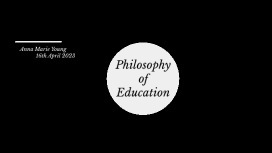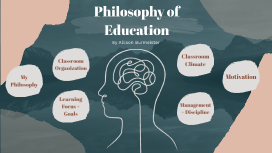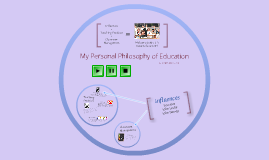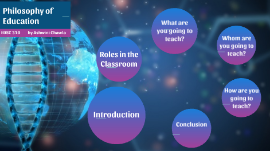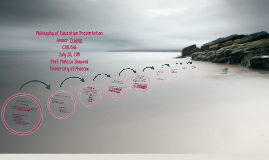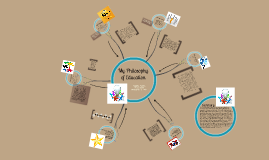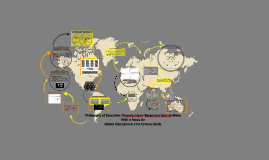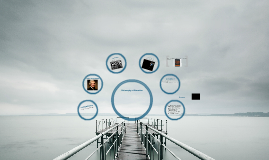Philosophy of Education Presentation
Transcript: Philosophy of Education by Ashwini Chawla EDSC 310 Introduction Introduction I am a student that loves to cook and play badminton in my spare time. Background: I graduated with a B.S. in biology and I have previously worked as a camp counselor, yoga instructor, and Zumba instructor. Goals: Become a biology teacher in Southern California Work towards receiving a master's degree Work at a school that I love and enjoy my job. What is the purpose of education? What is the Purpose of Education? Challenge the mind Learn from the past, observe the present, prepare for the future Broaden your horizons Challenge the Mind Education can: help to forge a new wave of well informed, highly intellectual, and morally upright civilians. engrave critical and logical reasoning skills to not only challenge the mind, but also train it to tackle any obstacle. instill an understanding of the importance of democratic ideals to pave the way for an equal, diverse, and inclusive society. Learn from the past, observe the present, prepare for the future Being an educator requires you to explain reality to the young, that is, address fundamental matters that are part of the world around us. This also includes explaining the role of human civilization and its contribution to the past, present, and future. The new generation will have a substantial effect on the future and it is essential for them to educated in preparation for what is to come and what can be changed. Broaden Your Horizons Education can allow one to elevate to higher echelons, whether they are social, geographical, or financial. It transcends borders and limitations. Roles in the Classroom Roles in the Classroom What is the role of a teacher? What is the Role of a Teacher? Teachers play many roles: Leader Mentor Role Model Observer Facilitator Chameleon Teachers have many responsibilities: They interact with the future generation beyond parental influence. They have the power to shape the youth to create a better future. What is the role of a student? Students also play several roles in education: Receptors of Knowledge Future Citizens Motivators and Helpers for One Another They also have many responsibilities: Fine Tuning their Time Management Skills Balancing Life and School Assisting Other Peers Playing a Larger Role in their Community What is the Role of the Student? What are you going to teach? What am I going to teach? My subject area My Subject Area is Biology Goals for my students Goals for my students To enjoy learning biology. To integrate and adapt to new technology. Become comfortable with complex topics by breaking them down and analyzing them. Combat scientific issues head on with consideration for modern technology and solutions. Most importantly, to encourage a sense of community and create a friendly environment in my classroom. Whom are you going to teach? Who are your students? What is special about adolescents? What is special about adolescents and why do you wish to teach this group? "Tell me, and I forget. Teach me and I remember. Involve me and I learn." - Benjamin Franklin They are the future generation, they literally are the future. Despite their naivety, they are honest and this interaction is refreshing in a world that is calculated. Adolescents are intelligent, curious, and are at a turning point in their life. I want to contribute to the future and inspire adolescents through a positive outlook. What are your beliefs about how adolescents learn? Students learn by example, teachers are the ultimate influence in the classroom. They also learn through relating topics to something interesting or contemporary that apply to their lifestyles. Lastly, students learn through simplicity, and the process of breaking down complex topics into simpler forms plays a pivotal role in their overall learning experience. What are your beliefs about how students learn? How are you going to teach? Designing Instruction Tailored to Adolescent Learning Curriculum Curriculum-What Subject Matter will you Teach? My science curriculum will be tailored to learning, and NOT memorizing information. Today, many teachers teach to test, and I want to focus my classroom environment on engaging activities that help my students learn. The curriculum will also allow for student input, so they can feel involved in their own learning. Memorization will not be the focus of my curriculum. The emphasis will lie in incorporating many creative, free writing assignments and projects. The curriculum will also be open to adaptations and changes, to allow for the integration of current events. Instructional Strategies Technology will be the biggest asset to my classroom, as it will allow for the curriculum to be up to date, while regularly adding new content to existing textbook material. Non-linguistic representations will often be used to foster visual learning and aid in long term retention. Lastly, the integration of group work activities in the classroom will help students to understand






